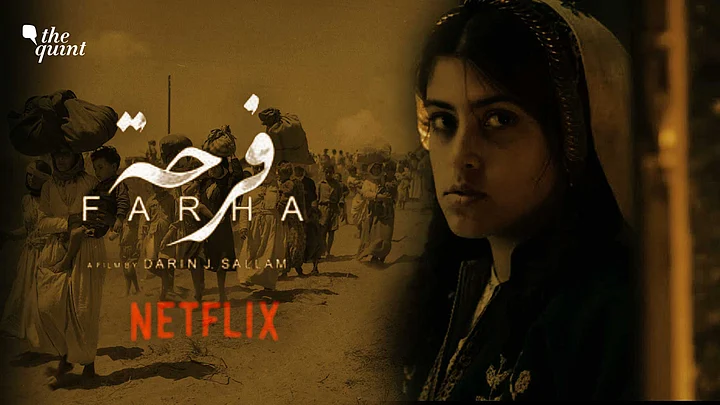The year is 1948. A young Palestinian girl— Farha, lives with her father and spends time with her friends in what seems like a blissful existence. She dreams of going to a city to study, but life has other plans for her.
A war breaks out as forces belonging to the newly created neighboring Jewish state Israel try and consolidate the land where they have brought refugees from across the globe. The war was labelled as "Israel’s War of Independence." For the Palestinians, the war will always be known as Nakba (Arabic word for displacement and ethnic cleansing). About 700,000 Palestinians were displaced at this time.
Why Are Israelis Irked by Netflix Film?
Jordan’s official entry for the 2023 Best International Feature Film has already made rounds of several film festivals and won awards. Earlier this month, Netflix dropped the film and it is now streaming worldwide. People are moved by the film and it has received strong positive reviews. But Israel would like to stop that from happening.
In the film, Farha’s father heads off to defend his village. He initially sends the girl with some friends, but she is strong-willed and decides to stay back. The only option for the father is to lock up the young girl in a storage room. And this is for her own safety as gunfire is heard across the village.
For much of the film, Farha only hears of the events happening outside on the streets. She is barely able to see through the cracks of the door to the storage room. What makes Farha stand out as a cinematic experience is that like the protagonist, we also find ourselves trapped in the room, unable to fully fathom what is happening in the outside world.
And then, through the cracks, Farha witnesses a small group of Israeli Defense Forces killing a Palestinian family that has just occupied her home. Among the members of the family left to die is a newborn baby. That is the only instance of violence we see unfolding in Farha. But it is disturbing as we are left to visualise most of the violence.
And this is what has angered some Israelis who claim the film creates a “false image” and projects the Israeli War of Independence in a negative light. People called Farha’s director Darin J Sallam a “terrorist Muslim.” The country’s outgoing finance minister who heads the right-wing Yisrael Beiteinu party was quoted in Time saying, “It’s crazy that Netflix decided to stream a movie whose whole purpose is to create a false pretense and incite against Israeli soldiers.” The anger has led to many Israelis canceling their Netflix subscriptions.
Israel’s Baffling Bias Over War Films
Israel’s wars with its neighbors have often been portrayed in cinema, especially by Israeli filmmakers. Samuel Maoz projected the plight of young Israeli soldiers trapped in a tank in Lebanon (2009)— the Venice Golden Lion-winning film that covered the 1982 Lebanon War. At the time of the release of the film, Maoz said he was not condemning Israel’s policies. Rather the film was his personal account of what he experienced as a soldier during the war.
The film was well-received in Israel. Moaz faced a lot more criticism for the depiction of the Israeli army in the 2017 film 'Foxtrot'. The film won the Grand Jury Prize at the Venice festival and also Israel’s top Ophir award, but it was denounced by the country’s Culture Minister who said it incited “the young generation against the most moral army in the world by spreading lies in the guise of Art.”
Israel and its politics can be puzzling. The Oscar-nominated 'Waltz With Bashir'— a stunning animation film that portrayed the massacre of Palestinians at the Sabra and Shantila refugee camps during the 1982 Lebanon War found a lot of support in the country.
The film’s director Ari Folman told NPR that he had at least expected some debate or controversy. But he was surprised when he was “hugged dearly by the whole political spectrum” and the government kept “sending the film all over the world at their expense.”
Nadav Lapid, the same filmmaker who last month criticised The Kashmir Files at the closing ceremony of the International Film Festival of India, is a harsh critic of Israel’s policies towards the Palestinian people. In Israel, his films are often rebuked even though they keep winning top awards at international festivals including at Berlin and Cannes.
How Art Is an Essential Tool To Speak Truth to Power
There are always two sides to the story of any war. The same can be said about controversial films depicting recent wars. Many Arabs have praised Farha for its honest depiction of the Nakba. Some Palestinian rights supporters believe that while their side often ends up losing on the ground given Israel’s military power, the future battles may be fought through Arts, with filmmakers narrating such powerful stories to keep the flame of the struggle alive.
Netflix has so far not responded to Israel’s demand although the streaming service is sometimes known to give in to political pressures from specific countries. A few years ago, Netflix pulled out an episode of Hasan Minhaj’s show Patriot Act in Saudi Arabia after the comedian criticised the country’s official response to the killing of the journalist Jamal Khashoggi.
Whatever Netflix decides, Farha should surely be watched by as many people as possible, including Israeli citizens. It is good art and it speaks the truth, even if it is an uncomfortable truth.
(Aseem Chhabra is an actor and producer, known for Sita Sings the Blues (2008), Iftar (2015) and Pulse: The Desi Beat (2007). He is also one of the organisers of NYIFF. He tweets @chhabs. This is a personal blog and the views expressed are the author’s own. The Quint neither endorses nor is responsible for them.)
